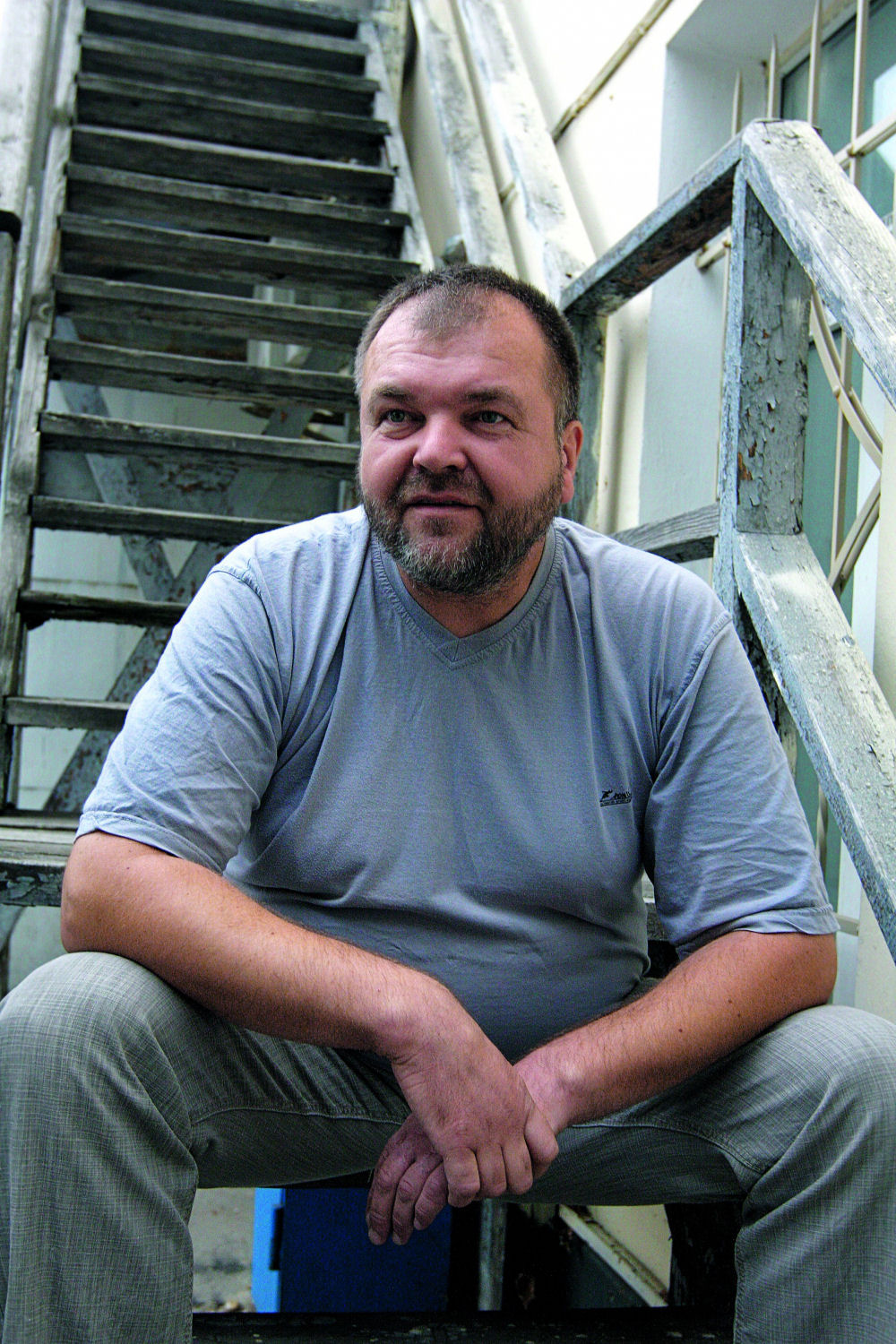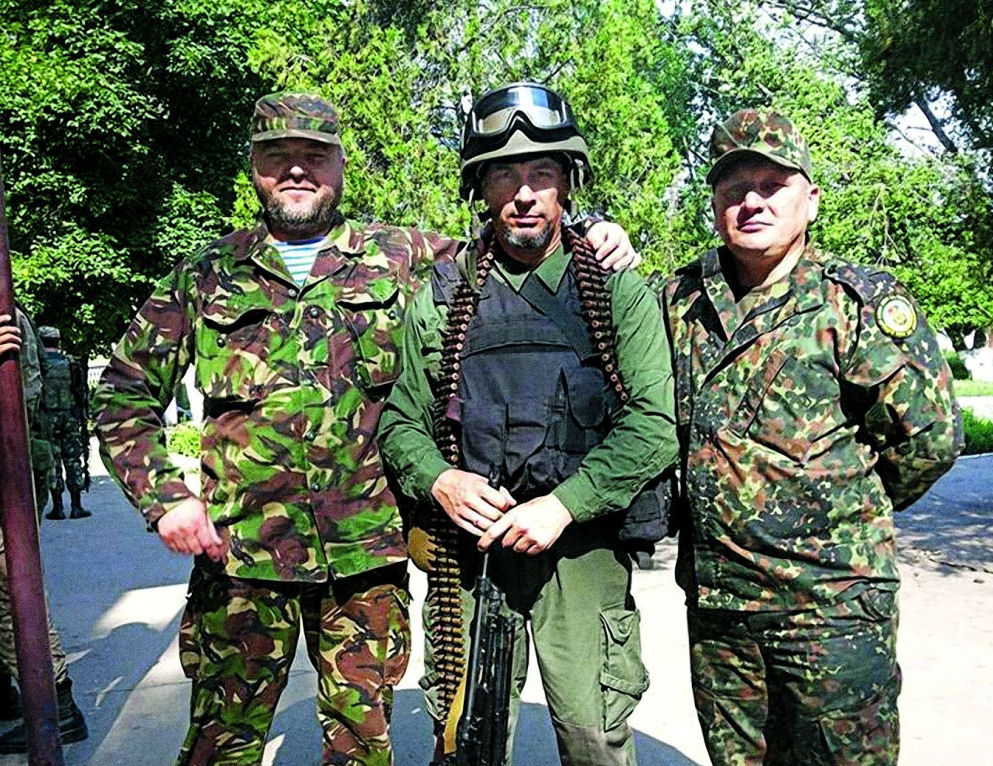Serhii Demchuk and Svitlana Korzhenko, Interview with Borys Humeniuk

Borys Humeniuk, Battalion OUN’s Second in Command, is convinced that the main principle to follow in battle is to kept moving. If you remain in one place, it will mean certain death.
Humeniuk has been at war since June. He says that it is much better to be in the war zone than to sit at home in front of the television and die from a broken heart.
‘Until now I hadn’t even learned to fire a hunting rifle. However, I’ve come to the realization that internally I have been preparing all my life to become a soldier. I am a husband, a father, a son, a citizen, a poet, and a novelist. I’ll return to all that later.
I came to the sudden realization that now I am a soldier, a combatant. The first time I ever held an automatic weapon was this past June, when I joined Battalion Azov. It all started from there. At that time the battalion was stationed at Berdiansk, Zaporizhzhia oblast. In one day I learned to handle a Kalashnikov, load it, discharge it, disassemble it, assemble it, fire it when alone and when in a group. By the next day I was already able to work in pairs. The ideal military subunit is twelve men: 2 for the RPG, 2 for the machine gun, a sniper, aimer, and six riflemen. Such an arrangement is prepared for any scale of difficulty.
One day, 20 new men arrived from the Maidan. However, the commander of Azov told them, ‘our battalion is at full strength. I have no place for you.’ Every one of them was discouraged, from the youngest to the oldest, a 65 year old man. I knew that we had many others who were still training all over the country, at Nizhnyi, Vynnytsia, Ternopil, Lviv, Ivano-Frankivsk, and Volyn.
I estimated that 300 soldiers could be mustered, so the decision was made to establish an entirely new independent battalion. I approached Andrii Biletskyi, the Commander of Azov, and I said, “the men are in agreement, and so am I. Currently we are tasked with the defense of Mariupol and the entire southern part of the Donetsk oblast. We have a total of 500 men in our battalion for this responsibility. We can always use assistance.’
It would be a great benefit for us to establish our own battalion. I spoke with nearly every deputy to the Minister of Internal Affairs, Arsen Avakov. They all gave the same reply: ‘No. We currently have 32 battalions, and we won’t erect a 33rd under any circumstances because it would be impossible to equip properly.
Then a friend of mine contacted the Minister of Defence, Valerii Heletyi, and gives the phone to me. We speak about granting our battalion official standing with the Ministry of Defence, and he keeps replying, “No, no no. You already have Aidar, and we don’t know what to do with it, let alone a second one.’ The other volunteer battalions are registered with the Ministry of Internal Affairs. The irony is that in order to defend one’s country, it seems that one must become a policeman. The stock response for everyone looking to join Azov sounds like this: ‘Please accept my application to the Ministry of Internal Affairs for the position of peace officer.’ Now, if a man has a conviction in his past, the best he can ask for is a job as a driver, a cook, or a stable hand.
The official who explained the rules to us stated that ‘you will defend your country, but until such time as a decision is reached, you have no right to carry weapons. So if someone asks you why you have a machine gun, you must say I am the second man on the team, an assistant to the officer. He stepped away for a moment and asked that I take care of his weapon.
In the ATO zone we are known as Battalion OUN. Officially, we are the battalion for the territorial defence of the city of Nizhyn, but are now here. The Mayor and officials took the risk of agreeing to our formation. Until our establishment they had no such defence. As a battalion, we are completely dependent for material and technical supplies on the general Ukrainian population. The problem we had during our first venture in the Donbas was securing fuel for our vans. We had no money. Now that has changed and we have fuel, food, and for all intents and purposes, ammunition. We depend on civilian benefactors. One item we received was a large truck, a HAZ-66. We have remodelled it and now call it the “banderamobile.”
One day a young man contacted us, saying ‘I was with the National Guards, had been wounded, and now that I’ve recovered, I don’t want to return to them. I’m looking to fight with your battalion.’ It is not easy to comprehend the psychological mindset of the volunteer: why does a person, knowing he will be killed, want to participate in this war? What’s his motivation? Does he have the soul of a kozak, or of a samurai?
Practically speaking, only a few volunteer battalions are doing the actual fighting. Aidar is currently located in the northern part of Luhansk oblast, Azov is in the south of Donetsk, with both Shakhtarsk and the volunteer corps of Pravyi Sektor and Dmytro Yarosh nearby. Alongside us you’ll find Dnipro, and also Battalion Donbas. I could mention two or three others now facing combat. All the rest, such as Ivano-Frankivsk and Ternopil battalions, are in various stages of development. To be sure, they are in the ATO zone, but are faraway in the rear, 100 or 200 km away from the front.
It is wrong to describe our enemies as separatists. If we had been facing separatists they would have been defeated within a week. We are at war with the regular army units of our neighbouring country. They have undergone very good training. They are confident and know how to shoot. Our chances of survival are 50-50 when we go into close battle against them. If there are a thousand of them arrayed against us, we need a thousand of our own men against them.
Our battalion is currently located in the village of Piska, Yasynuvatskyi raion, and is three km from Donetsk. We eat and sleep in a house that has been provided for us. The owner is a 65 year old man, and he moved into his garage, which is the safest place on the property. He walks about the yard, and invites us inside, while we share coffee and food with him over the fence. We ask him whose side he is on, and he replies, on the side of peace.
We became aware of a sniper located 2 km away. Any carefree lingering, while walking to the bathroom, for example, is impossible. You must always run, and run fast. The main thing to remember in a war is to keep moving. It means death if you just stand in one spot. Nothing can save you from a sniper’s bullet, neither a vest nor a helmet. Such a bullet will pierce the human body and exit through the other side. The only relief is to get a fix on the sniper’s location and shell him with artillery and mortars.
While digging a slit trench, you have a love-hate relationship with the ground. You are aware of the fact that here is half of your protection. There is also a 50% chance that this location might become your grave. Nonetheless, it is the best place in the world. You can only get killed by a direct hit from the air. We have been shelled by ‘hrad’ missiles, mortars, and small arms fire. The enemy usually opens fire from 1700-2300 hours, so predictably in fact that the men even joke about the “after dinner greasing.” I have no explanation for why they rarely shoot during the day.
During those times when it is truly frightening, your mind wanders in strange ways. Stress has an effect on your body, first by becoming tense; then you become weak. On occasion grown men lose control over their bodily functions. These are physiological reactions and no one ridicules them about it.
We are often visited by officers, lieutenant colonels and majors. They tell us, ‘we are combat officers.’ Except when the fighting starts, they hide under their blankets, food rations in one hand, cell phone in the other, yelling into to phone to their commanding officer, ‘get me out of here.’ An old village man with a criminal record as commander would conduct himself better. He would have enough sense to give orders to his men, once they have grouped together out of fear, ‘you shoot from here, you go there, you cover the back, and you two watch the sides.’
It is most important while in battle to keep shooting; accuracy isn’t so important. When bullets are flying at his head, the enemy will instinctively act to protect his head, and so he won’t be able to return fire all that well. If you are not shooting, that gives him time to aim and kill instantly.
The fundamental burden of the war, at least 90% of it, with all due respect to the volunteer formation of which I am a member, is carried by the regular army. First, there are a lot more regular forces. Second, they have the tanks, the artillery, the weapons, the air force. We are attached to a mechanized brigade. On one flank can be found the volunteer battalion Dnipro, while on the other is Yarosh’s volunteer corps. All of us coordinate our actions. However, without exception it is the army that receives its orders from the general staff, and then they relay them to us.
Ukrainians have finally realized that Russia was the only enemy we have ever had. There have been moments with the Poles, the Turks, and the Tatars, but there has only been one real enemy. And now at last we have engaged that enemy. We are in for a long war, but one that will end with the collapse of Russia. If we stop now, it will mean that our generation of men have placed self-preservation as a higher value, only meaning that we have saddled our children and grandchildren with the task of solving this problem….”
[hr]Source: gazeta.ua, translated by Jeffrey Stepaniuk






